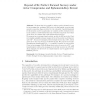104 search results - page 4 / 21 » Modeling Key Compromise Impersonation Attacks on Group Key E... |
CCS
2008
ACM
13 years 7 months ago
2008
ACM
When users run a group key exchange (GKE) protocol, they usually extract the key from some auxiliary (ephemeral) secret information generated during the execution. Strong corrupti...
ASIACRYPT
2001
Springer
13 years 9 months ago
2001
Springer
Abstract. In this paper, we consider the problem of mutually authenticated key exchanges between a low-power client and a powerful server. We show how the Jakobsson-Pointcheval sch...
ACNS
2009
Springer
14 years 11 days ago
2009
Springer
Abstract. In the paper “Stronger Security of Authenticated Key Exchange” [1,2], a new security model for authenticated key exchange protocols (eCK) is proposed. The new model i...
ESORICS
2012
Springer
11 years 8 months ago
2012
Springer
We show that it is possible to achieve perfect forward secrecy in two-message key exchange (KE) protocols that satisfy even stronger security properties than provided by the extend...
CADE
2004
Springer
14 years 6 months ago
2004
Springer
Abstract. Automated tools for finding attacks on flawed security protocols often struggle to deal with protocols for group key agreement. Systems designed for fixed 2 or 3 party pr...

